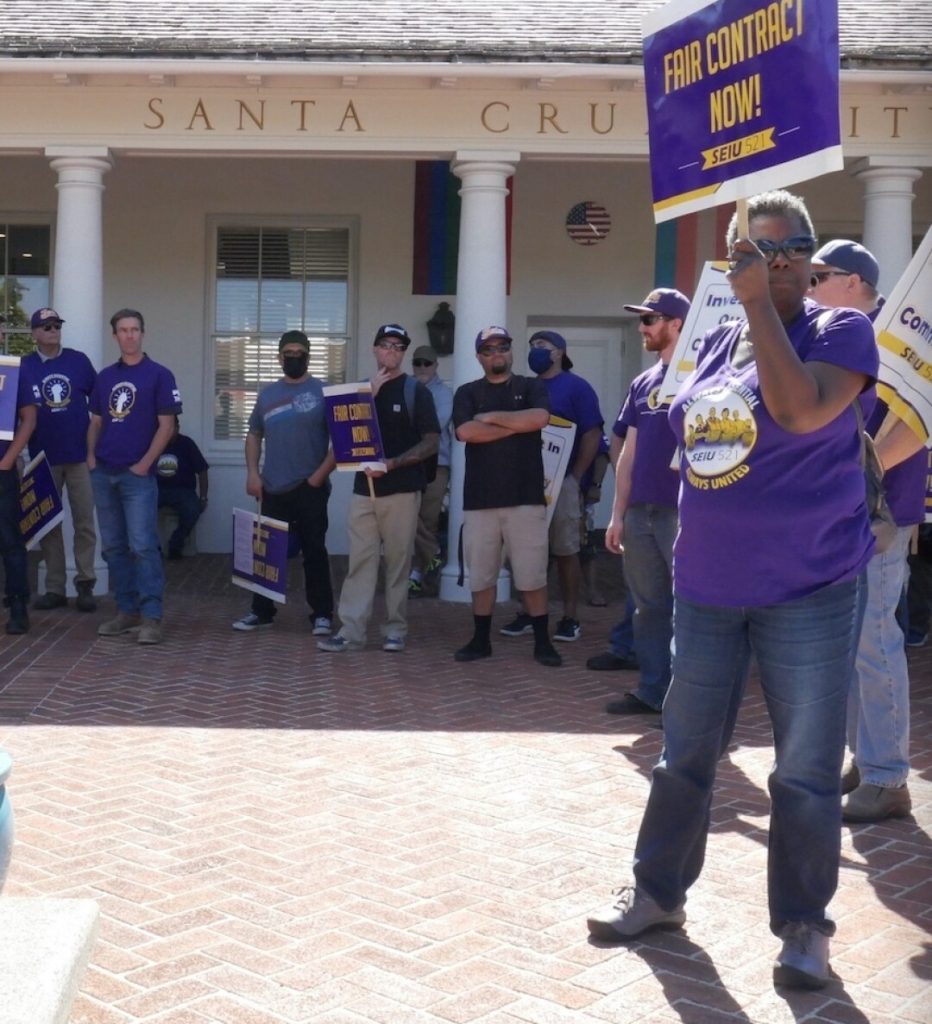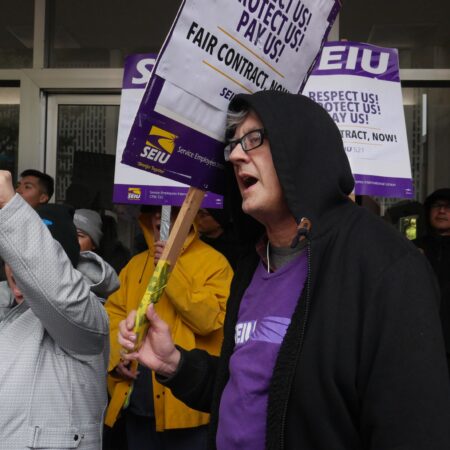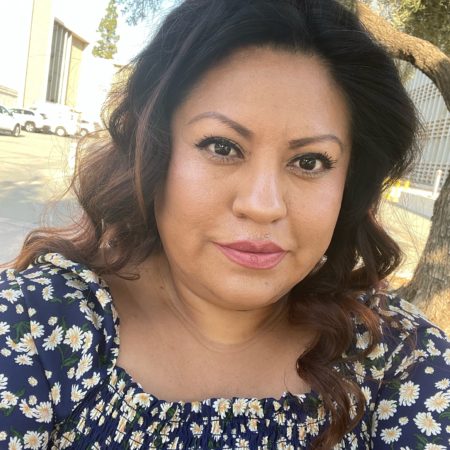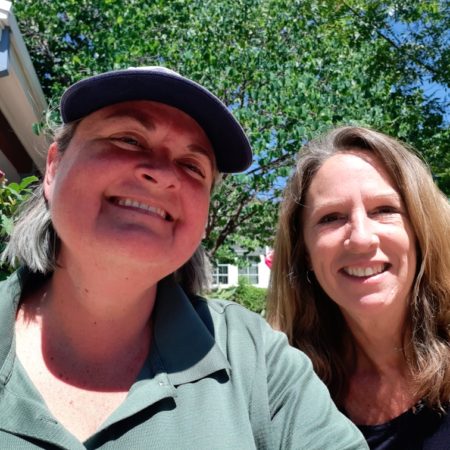Via Lookout Santa Cruz by LESLIE AUERBACH, KEN BARE, ERIC BUMGARNER, BRIAN CLINE, EMILIO GALVAN, JUAN MOLINA, TED ROSSITER, GUILLERMO SORIANO, DAVID TANNACI
Santa Cruz’s 600 union workers — the people who collect the city’s garbage, test water, maintain parks and roads — are fed up with what they see as low wages and disrespect from public officials. Five months into bargaining with the city, they write, the talks are going nowhere. They want higher salaries, more on-the-job safety, and more respect. They say they are paid 15.3% less than average long-term workers and 8.7% less than in nearby cities. As a result, some Santa Cruz city workers are living in cars, maxing out credit and camping in the very parks they maintain.
Santa Cruz is not providing adequate wages or job security for its nearly 600 union workers.
We are the people who maintain public parks and roads, test water and collect garbage. We are fighting for a contract that increases the quality and quantity of public services for all city residents.
That change will mean cleaner public restrooms, more efficient garbage collection and improved road maintenance.
We have been negotiating for the better part of five months and the city has developed a deplorable relationship with our union, Service Employees International Union Local 521 (SEIU 521). Most of us engaged in the negotiations are long-term workers who have spent decades living in and serving Santa Cruz.
Here’s a big part of our frustration: Santa Cruz pays us 15.3% less than average long-term workers, according to a 2022 study commissioned by the city.Accounting for total compensation, city workers earn 8.7% less in total compensation than they would doing similar work elsewhere. That includes cities like Sunnyvale and Mountain View, which have similar budgets and workforces, but opt to work with our union to pay and treat workers well.
The most a senior Santa Cruz water distributor operator can currently hope to make after exhausting their career arc is $6,033 a month. By comparison, the same position in Sunnyvale earns $7,287 a month, while a worker in Mountain View earns $9,339 a month at the top step. The starting wage in Santa Cruz for a water distributor operator is $3,122 per month before taxes.
We and you, our community, deserve better.
Santa Cruz can’t be a forward-looking, progressive, inclusive community if we don’t treat our workers with respect.
Inflation now surpasses 8.3%; city workers now face economic hardships compounded by years of low wages. Our fellow workers’ stories are unnerving. Some co-workers can’t pay their rent — despite working full-time jobs — and are now living in their cars. They can’t afford to live in Santa Cruz on the city’s unlivable wage.
Ironically and sadly, some of our houseless co-workers have sought shelter in the same public spaces they maintain. One of our colleagues now depends on predatory loans, because they maxed out their credit cards.
Dozens of us have taken on second or third jobs in order to pay bills. Our SEIU bargaining team has lost count of the number of workers wiping out their savings to cover living costs.
Our job safety remains a major unaddressed concern, as is the condition of public facilities, many of which are in need of immense attention. In particular, the Santa Cruz Riverwalk, the houseless encampment at 701 Ocean St., and the city’s sanitation processing facility often pose serious dangers to those of us tasked with upkeep.
That upkeep includes cleaning public bathrooms full of refuse, urine, used needles (often bloody and/or drug-filled), feces and infectious bacteria. Workers have contracted air- and blood-borne pathogens or illnesses like COVID-19, influenza, tetanus and strains of hepatitis while on the job.
Many of us do not have adequate protective equipment to clean these facilities and to keep ourselves safe. For instance, our gloves and uniforms are often worn-down, ratty and full of holes. City systems, like the large network of pipes that deliver fresh drinking water, are poorly maintained.
Pipes burst and leak at high rates, wasting significant amounts of water and crucial hours on emergency projects. As a result, the quality of water in portions of Santa Cruz, while completely safe, remains worse than it could be.

The task of procuring new items — work gloves, uniforms — is off-putting and often humiliating for us. We have to endure meetings with managers who pepper us with questions about the legitimacy of our requests. In several instances, workers were forced to beg for replacements.
It’s not surprising that a large number of our colleagues give up and leave.
Even while underpaying and underprotecting its workforce, the city enjoys a $36 million general fund surplus — the highest reserve surplus in at least a decade.The health of the city’s treasury stems from worker sacrifices, including a 10% long-term furlough during COVID-19, which saved the city $3.6 million.
Overall, management’s impossible behavior (lack of appropriate pay, poor response to staffing crisis and on-the-job safety) lies in stark contrast to the grit our co-workers show. This dynamic is creating a staffing and retention crisis caused by the city.
Santa Cruz has become a de facto training ground for workers who leave for better-paying nearby public service jobs. This affects positions like chemists, wastewater operators and equipment mechanics.
A shortage of these specialized hires compounds workloads for those who do stick around. To keep up with demand, the city often pays and enters into contracts with private companies, destabilizing the wages of city workers, because the city underbids the cost of labor.
Some people might think working for the city comes with a flashy retirement plan, high, stable wages and few responsibilities.
They are wrong.
The truth is the furlough, concessions and budget cuts the city enacted during the pandemic brought about our current budget surplus.
The city’s retention crisis — caused in large part by inadequate compensation and safety protections — can improve, if the city chooses to invest in its workforce. A place to start is by filling the more than 60 vacancies in key departments. Departments like sanitation, wastewater, and public works — many crucial public services our community depends on — are unnecessarily suffering.
City negotiators fail to understand how the cycle of low wages, unsafe working conditions and deteriorating infrastructure affect the ability to deliver the services Santa Cruz residents need on a daily basis. Their behavior in our bargaining sessions is worse.
Negotiators are using administrative tools to disempower workers by submitting incomplete bargaining proposals, deliberately showing up late, unprepared or canceling bargaining sessions outright at the eleventh hour.
We have created a petition to urge the city council and city negotiators to come to an agreement with us.
City workers are strong and resilient. We believe in the power of the public, our co-workers and in our union. We believe the need for essential city services outweighs the crude spectacle the City of Santa Cruz calls “bargaining in good faith.”
Every Santa Cruzan who needs our public services deserves better.
We ask the city to treat us with respect, a living wage, and safe working conditions.
SEIU 521 City of Santa Cruz Bargaining Team: Leslie Auerbach (library), Ken Bare (chapter president, parking control), Guillermo Soriano (solid waste), David Tannaci (water engineering) Eric Bumgarner (wastewater), Brian Cline (wastewater), Emilio Galvan (facilities), Juan Molina (wastewater), Ted Rossiter (IT). The majority of bargaining team members are long-term Santa Cruz residents who began working for the city no later than 2016; about half started between 1997 and 2013.



